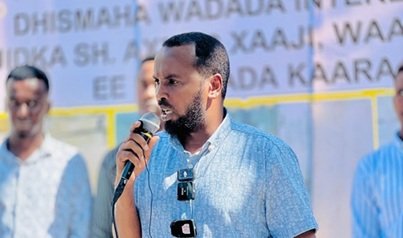By Abdiqani H. Abdi
In a shocking public address on May 4, 2025, Yusuf Adani, the District Commissioner of Karaan in Somalia’s Banaadir region, issued a chilling call to violence. Standing before a crowd of residents, he urged civilians to physically attack, mutilate, or kill anyone who expressed opposition to the Somali federal government. His words—brazen, tribalistic, and reminiscent of genocidal propaganda—should send a shiver down the spine of anyone familiar with the precursors to mass atrocities.
“If someone opposes the government, attack them in their homes. Kill them, use machetes—you have permission,” Adani declared. “They’ve been sent by terrorists, break their bones. A person like that cannot live in Karaan. If such a case happens, you must arrest them, take them to the station, and beat them.”
This grotesque incitement to mob violence and summary executions against perceived political dissenters is not only a violation of domestic and international law—it is a human rights crisis in the making.
Adani, a former police commander in Yaqshid District, previously aligned himself with the opposition movement Badbaado Qaran during President Mohamed Abdullahi Farmaajo’s tenure. That same movement was led by none other than the current president, Hassan Sheikh Mohamud. Ironically, the very official who now advocates violence against dissenters once identified as a defender of political freedom—only when the shoe was on the other foot. This dangerous hypocrisy not only discredits the integrity of governance in Somalia but also exposes the tribalist undercurrent that now animates state power.
The failure of President Hassan Sheikh Mohamud and Banadir region governor to condemn, suspend, or investigate Adani’s inflammatory rhetoric is perhaps the most damning element of this story. At a time when the region teeters on the edge of instability, the president’s silence amounts to tacit approval.
Somalia, a country long plagued by civil war, terrorism, and political fragility, cannot afford to ignore language that so blatantly promotes ethnic and political cleansing. The echoes of Rwanda are undeniable. During the 1994 genocide, officials used state platforms to dehumanize Tutsis, calling them “cockroaches” and urging Hutu civilians to take up machetes in defense of their tribe. The result was one of the most horrific genocides in recent history—over 800,000 dead in 100 days.
Adani’s invocation of machetes and the labeling of opposition as “terrorist agents” follow that same playbook. It is not just irresponsible; it is criminal.
The response from Somalia’s federal government, or lack thereof, reflects an entrenched culture of impunity, especially when it comes to figures aligned with the ruling elite. Under President Hassan’s administration, government institutions have increasingly shown signs of centralization, partisanship, and clan favoritism. Federal member states like Puntland and Jubaland, have repeatedly accused Villa Somalia of marginalizing them, weaponizing aid, and interfering in regional governance. This environment fosters not only political breakdown but also societal fragmentation—a dangerous mix when overlain with calls to vigilante violence.
Somalia’s international partners—including the African Union, IGAD, the United Nations, and Western donors—must take this situation seriously. Billions of dollars have been poured into Somalia in the name of state-building, peacekeeping, and democratization. But no stable state can emerge where government officials openly call for the murder of fellow citizens for holding dissenting views. No genuine democracy can exist under the shadow of intimidation and fear.
Human rights organizations must demand that Yusuf Adani be held accountable in a court of law, both domestically and internationally. Somalia’s Attorney General must investigate the legality of Adani’s speech under Somalia’s constitution and penal code. The country’s Human Rights Commission—if still operational—should issue a formal censure. Internationally, entities like the International Criminal Court must begin collecting and archiving such statements. The seeds of atrocity are sown through speech, and the world has a responsibility to act before those seeds bear bloody fruit.
Ultimately, the Somali people deserve leaders who protect their rights, not ones who threaten them with machetes. Somalia has suffered enough—from the days of Barre’s dictatorship, through the collapse of the state, to the rise of Al-Shabaab. It cannot afford another era of state-sponsored terror, dressed up as patriotism.
What happened in Karaan should alarm every Somali citizen and every international ally of Somalia. The call to murder dissenters is a crime against conscience, against law, and against humanity. It is not merely a domestic affair—it is a global warning sign. And it must not go unanswered.
Abdiqani Haji Abdi
Email: Hajiabdi0128@gmail.com


Leave a Reply